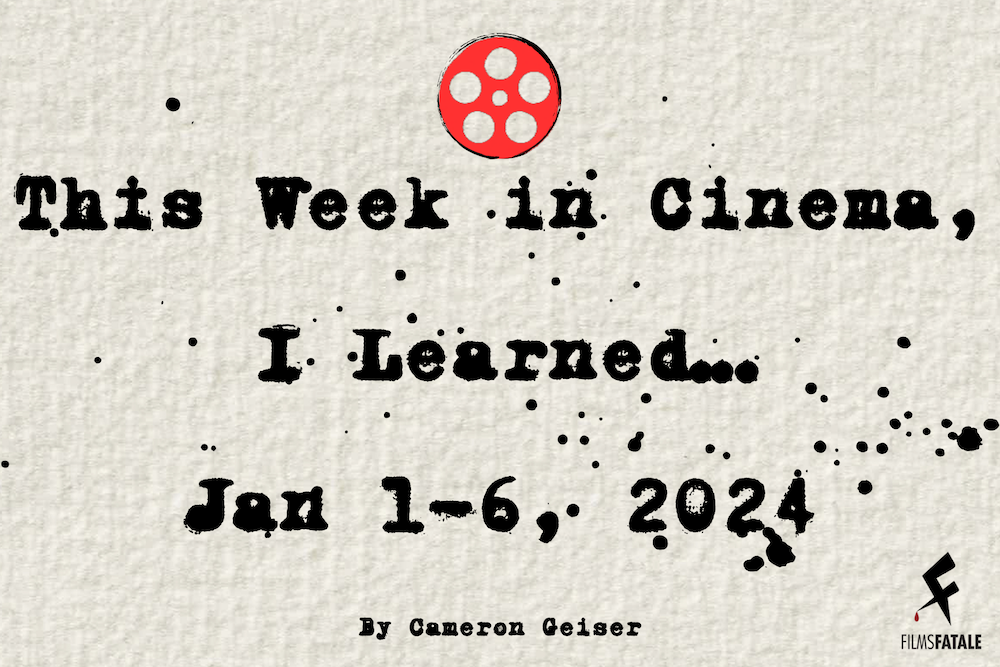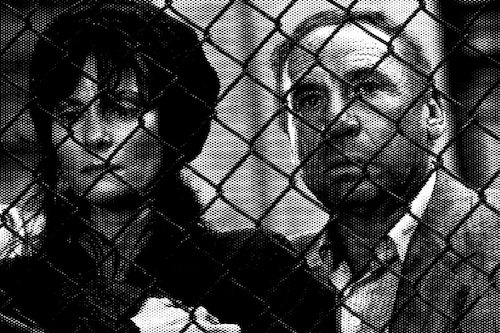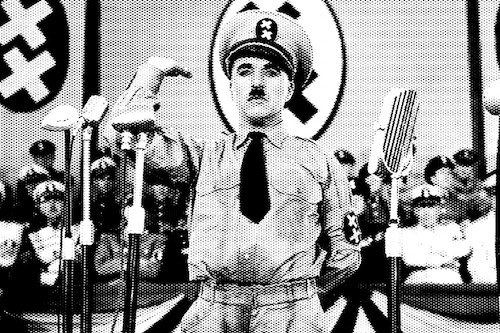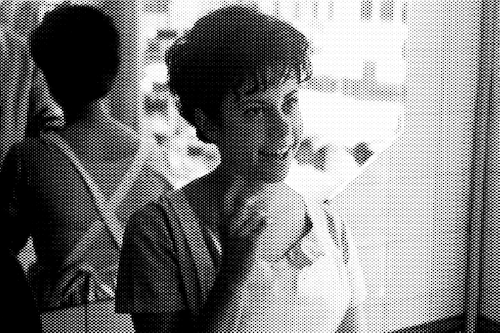This Week in Cinema, I Learned… Jan 1-6 2024
Written by Cameron Geiser
Welcome to This Week in Cinema, a yearlong film criticism project wherein I will be watching a new film that I haven't seen every single day.
There will be a few exceptions. I have allowed myself one rewatch of a previously seen film every month, for sanity's sake. Most months will have a general theme that I've organized the film selections around, though June and July will function as the same overarching theme of “Summer Films”, and all that entails. January's theme is a mashup of Arthouse Catch-up and Wintertime Joy. As someone who is affected by the lack of sunlight each winter, most films will be essentially “Film Homework” in that I should have gotten around to some of these films before now, but as they say, c'est la vie. As for the Wintertime Joy, some films were purely selected to give me that sweet serotonin straight to the dome amid wintry nights that begin at 5:30 pm.
Also, I intend to answer the question of what I learned each week from this project. With this first week, I must say that the initial lesson was more of a reminder of the depth and breadth of the medium that is Cinema. Across the globe, there is no better medium for human expression in my opinion, from Charlie Chaplin to Shintaro Katsu anything is possible in the dreamscape of filmmaking. Without further ado, let's begin with the first film of the year from Mel Brooks.
January 1st
Life Stinks (1991)
3/5
After reading Mel Brooks' memoir last year, All About Me!, I knew I had to get around to watching all of his movies at some point and this project is the perfect place to start! As sort of a joke at the expense of the year 2023 (Not exactly the best year of my life) I thought it would be prudent to start off with a comedy. The fact that it's a story about humility and a cartoonish Billionaire being forced into the life of a homeless person for a month straight just to win a real estate deal is perfection. Life Stinks also effortlessly reaffirms that Mel Brooks is the King of the visual gag in comedy, and well, it's good to be the King. The film was more emotionally mature than I was expecting, given that it's a Brooks production, I assumed it would be a pure gag-fest jumping from comedic bits to larger set pieces like in Blazing Saddles or Spaceballs, but I was wrong and I love that. Also, the homage to The Three Stooges' physical comedy was a nice touch.
January 2nd
Zatoichi: Darkness Is His Ally (1989)
3/5
My first large film criticism project was one that I wrote on my personal blog back in December of 2019, where I noticed that there were twenty-five Zatoichi films in the Criterion Collection set, thus Twenty-Five Days of Zatoichi was born. It's still the most viewed of all my projects there and I adore the evolution of the films as they were being made over an eleven-year period. As it turns out, years after Shintaro Katsu had ended the film series to focus on a successful TV adaptation of Zatoichi, he returned in 1989 to star in, and direct, one last film starring the popular blind swordsman. Darkness is his Ally will be immediately familiar to any that have seen the older films, or the TV show, as it relies on many of the same staples of the franchise. We're greeted with a graying Zatoichi, he's older now and a bit slower to immediately draw his blade, but once he does the film ends up being one of the bloodiest in the series. Not in terms of a body count (Zatoichi practically invented the “one versus many” Samurai film staple), but in the gallons of blood sprayed all over the actors and the various sets. It's a solid entry in the franchise and one that actually allowed Zatoichi to express his sexuality for once. There's also some synth injected into the score for a flair of 1980s-tinged power-fantasy violence. It's a good time, but I'd suggest at least watching one of the other films before this one. I recommend Zatoichi Challenged.
January 3rd
The Great Dictator (1940)
5/5
Before The Great Dictator, I'd only seen a few of Charlie Chaplin's short films from the late 1910s and early 1920s. Little did I know I was robbing myself of one of the masters of cinema itself. Everything about this film works brilliantly. From the concept of Chaplin playing both the Jewish Barber and Hitler stand-in Dictator Adenoid Hynkel, to his brutal satire of the idiocy of the Nazis in everything they did, I don't use the word perfection lightly, but this might be just that. In short, the film is genius and truth be told it's goddamn hilarious. I particularly loved the idea of ostensibly taking a German World War One veteran into the dredges of World War Two without the two decades of baggage due to his amnesia. It's a lovely takedown of the banal stupidity of Fascism and Barbarism by turning it into the joke that it is. If, like me, you haven't seen this one yet, give it a shot!
January 4th
Jeanne Dielman, 23 quai du Commerce, 1080 Bruxelles (1975)
2/5
Okay, so, ever since The British Film Institute and Sight and Sound selected this film, as it does once every decade, as the best film of all time- I've wanted to give it a watch. Jeanne Dielman, 23 quai du Commerce, 1080 Bruxelles being selected as the best film ever made feels like a prank. Having watched the entirety of the three-and-a-half hours of Chantal Akerman’s experimental art-house feminist film, I am mystified as to why this film was chosen above all others. We witness three days in the life of Jeanne Dielman as she cares for her teenage son, prepares meals, makes the bed, does some dishes, and meets with three different men as she hustles as a part-time sex worker. I don't take umbrage with the core concept, or that this is the first time a woman filmmaker has even cracked the top ten in Sight and Sound’s history, what pains me most is how absolutely, painfully, slow and tedious the film is. If there is a plot or story taking place, I am unaware of it other than the fact that we are watching this woman live her life. In fact, the film feels incredibly invasive and creepy, voyeuristic in the worst ways. Mainly due to the invading nature of the camera in this random person's life. Nothing of note happens until the last ten minutes when she suddenly stabs the final man to visit her, after which she sits at a table for seven minutes straight until the film cuts to black. If you thought Killers of The Flower Moon was too long or too slow- you do not know what slow is. While I heartily disagree with the BFI and Sight and Sound, I am happy to have watched this film in the first week of this year. If I can watch all of Jeanne Dielman, 23 quai du Commerce, 1080 Bruxelles- I can get through anything!
January 5th
Fantastic Mr. Fox (2009)
4/5
I've always enjoyed most of Wes Anderson's films, but I never got around to his first stop-motion film, Fantastic Mr. Fox. While I quite enjoy Isle of Dogs, this snappy little adaptation of Roald Dahl's novel for children has a faster pace to it and a more general sense of optimistic whimsy filling its atmosphere than the somber tone of that film. As with all of Anderson's films, the casting fits as perfectly snugly as a hand-stitched sweater, but I particularly loved Jason Schwartzman as Mr. Fox's son Ash and Bill Murray as Badger- Mr. Fox's lawyer. Anderson alumni return to voice a litany of characters but George Clooney as the titular Mr. Fox was an excellent standout in the lead role. The animated stop motion was fluid and retained Andersonian style to it, but this is the first film from him where his style felt tertiary to the production. This film is an excellent example of blending three distinctly different artists' work together in which each element elevates the others without overshadowing them. Turns out if you combine Roald Dahl, Noah Baumbach, and Wes Anderson, you get something fantastic!
January 6th
The Bakery Girl of Monceau (1963)
3/5
The first of Éric Rohmer's Six Moral Tales, The Bakery Girl of Monceau, is actually a short film running at twenty-four minutes long. As I didn't realize this right away, and having just put in my time for the week with Jeanne Dielman, I feel I have earned the shorter runtime. Anyway, I've always heard that Éric Rohmer was one of the major players of the French New Wave and I believe he is the last major filmmaker that sprung from that movement whose films I still needed to see. Having watched at least a few films each from François Truffaut, Jean-Pierre Melville, Agnès Varda, and Jean-Luc Godard- it was time to see what Rohmer's films were all about. I quite enjoyed this short, though the lead male character did begin to lose my interest over time. The one thing I've always found a bit off-putting with the French films of this era is the overconfident nature of most male protagonists- they all border on arrogant and ambivalent at times. The first half I thought was rather charming and romantically French in nature. A young man roaming the streets of Paris hoping for a chance to encounter the beautiful woman who crosses paths, and eyes, with our lead often. Though our protagonist's manipulation of the titular bakery girl was, ironically, kind of immoral and self-serving. Though overall it was an intriguing introduction to Éric Rohmer's work, I look forward to seeing how he evolves as a filmmaker over time.
Cameron Geiser is an avid consumer of films and books about filmmakers. He'll watch any film at least once, and can usually be spotted at the annual Traverse City Film Festival in Northern Michigan. He also writes about film over at www.spacecortezwrites.com.









